#zen buddhist
Text
[P.S Sunyata is the sanskrit (buddhist sanskrit word) for the void state/I am state! ❤️]
1. Sunyata (Emptiness) is the profound meaning of the Mahayana Teaching.
Two thousand five hundred years ago, the Buddha was able to realise "emptiness" (s. sunyata). By doing so he freed himself from unsatisfactoriness (s. dukkha). From the standpoint of enlightenment, sunyata is the reality of all worldly existences (s. dharma). It is the realisation of Bodhi — Prajna. From the standpoint of liberation, sunyata is the skilful means that disentangle oneself from defilement and unsatisfactoriness. The realisation of sunyata leads one to no attachment and clinging. It is the skilful means towards enlightenment and also the fruit of enlightenment.
There are two ways for us to understand this concept of sunyata in the Mahayana context. One way is to try to understand the explanation about its true nature. The other way is the realisation through practice. What we are going to discuss now is about its true nature.
Mahayana teachings have always considered that the understanding of sunyata is an attainment which is extremely difficult and extraordinarily profound.
For example, in the Prajna Sutra it says "That which is profound, has sunyata and non-attachment as its significance. No form nor deeds, no rising nor falling, are its implications."
Again in the Dvadasanikaya Sastra (composed by Nagarjuna, translated to Chinese by Kumarajiva A.D. 408) it says: "The greatest wisdom is the so-called sunyata."
This sunyata, no creation, calmness and extinction (s. nirvana) is of a profound significance in the Mahayana teachings. Why do we see it as the most profound teaching? This is because there is no worldly knowledge, be it general studies, science or philosophy, that can lead to the attainment of the state of sunyata. The only path to its realisation is via the supreme wisdom of an impassionate and discriminating mind. It is beyond the common worldly understanding.
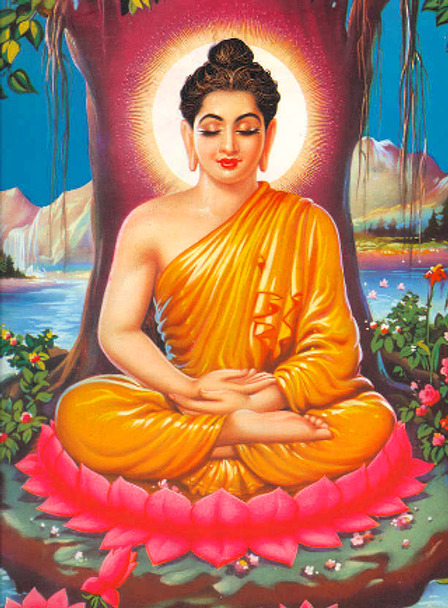
🧡🧡🧡
#void state#void success#buddhism#buddhist#buddhist monk#zen quotes#zen buddhist#mahayana buddhism#void motivation#buddha#enlightenment#buddhawisdom
16 notes
·
View notes
Quote
Water is yielding but all-conquering. Water extinguishes Fire or, finding itself likely to be defeated, escapes as steam and re-forms. Water washes away soft Earth or, when confronted by rocks, seeks a way round. Water corrodes Iron till it crumbles to dust; it saturates the atmosphere so that Wind dies. Water gives way to obstacles with deceptive humility, for no power can prevent it following its destined course to the sea. Water conquers by yielding; it never attacks but always wins the last battle.
Tao Chênh of Nan Yeo, an 11th-century Taoist scholar
#water#way of water#the way of water#be like water#act like water#flow like water#tao#taoist#taoism#dao#daoism#daoist#tao chênh#tao chenh#nan yeo#zen#zazen#buddhist#buddhism#zen buddhist#zen buddhism#clouds#clouds and water#unsui#the wheel of life#wheel of life#virtue#virtue of water#the virtue of water#virtuous
82 notes
·
View notes
Text

Autumn: a great moment to stay zen.
📍: Enkō-ji Temple, Kyoto, Japan
📸: (Image by tawatchai07 on Freepik)
#japanphotos#enkoji#円光寺#kyoto#京都市#zen#enkoji temple#autumn vibes#autumn photos#autumn landscapes#autumn japan#autumn in japan#nature photos#buddhist temple#zen buddhist#amazing japan#japan photography#japan daily#japan#日本#life in japan#japan tourism#japan pictures#japan landscapes#japan photo#travel photography#japan travel#discover japan#akaiji
8 notes
·
View notes
Text
How Zen Master Hughes changed society?
Have you heard any success stories of how Hughes, approach to mindfulness has helped troubled youth? Zen Master Hughes embodies the essence of Zen Buddhist: a harmonious blend of meditation, compassion, and engaged action. His presence enriches the spiritual landscape, inviting us all to awaken to our true nature.
1 note
·
View note
Text
Book Review: Appalachian Zen by Steve Kanji Ruhl
A memoir written throughout one man’s life looking back on his childhood in the Appalachian region of Pennsylvania and following his journey to becoming a Zen Buddhist minister in Massachusetts.
Summary:Edgy, lyrical, and lovingly rendered, this book recounts how a kid from a Pennsylvania mill-town trailer park grew up—surrounded by backwoods farms and amid grief, violence, and passionate…

View On WordPress
#appalachia#appalachian zen#book#book review#massachusetts#memoir#pennsylvania#Review#steve kanji ruhl#zen#zen buddhist
0 notes
Text

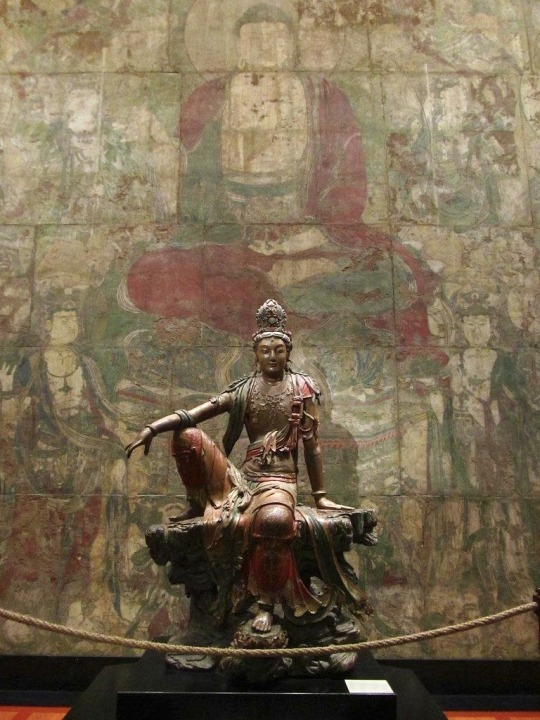
Guanyin of the Southern Sea
A wood statue of the Chinese-Buddhist deity Guanyin. Made during the Liao (916–1125) or Jin (1115–1234) dynasties.
It’s currently located in The Nelson-Atkins Museum of Art, Kansas City, Missouri.
#china#chinese culture#chinese history#east asia#Buddhism#Chinese Buddhism#zen buddhism#guanyin#museum#artifact#wood statues#statues#Buddhist deity#medieval china#ancient china
474 notes
·
View notes
Text
big fan of just existing with no expectations. my 'greater purpose' is to eat food and drink water and love and be kind and be alive until it's time for me to die. call me a hippie if you want but that's all i need.
#i might be something of a zen buddhist#this also might be influenced by the fact that all my big dreams were crushed by capitalism
438 notes
·
View notes
Text
In meditation we pay attention to our internal language so we can break free of the belief that our story is the one true picture of the way things are.
— Nothing Holy About It: The Zen of Being Just Who You Are by Tim Burkett
213 notes
·
View notes
Text

Look!
This is your world!
You can't not look.
There is no other world.
This is your world; it is your feast.
You inherited this; you inherited these eyeballs; you inherited this world of color.
Look at the greatness of the whole thing. Look!
Don't hesitate - look!
Open your eyes.
Don't blink,
and look, look - look further.
~ Chögyam Trungpa
158 notes
·
View notes
Text
"You must be broad-minded and whole without relying upon others. An upright, independent spirit knows how to avoid degrading situations." - Hongzhi Zhengjue (1091-1157)
#buddhism#zen#buddhist#innerpeace#buddha#buddhism quotes#zenquotes#dharma#buddhist quotes#spirituality#meditation#meditate
69 notes
·
View notes
Text
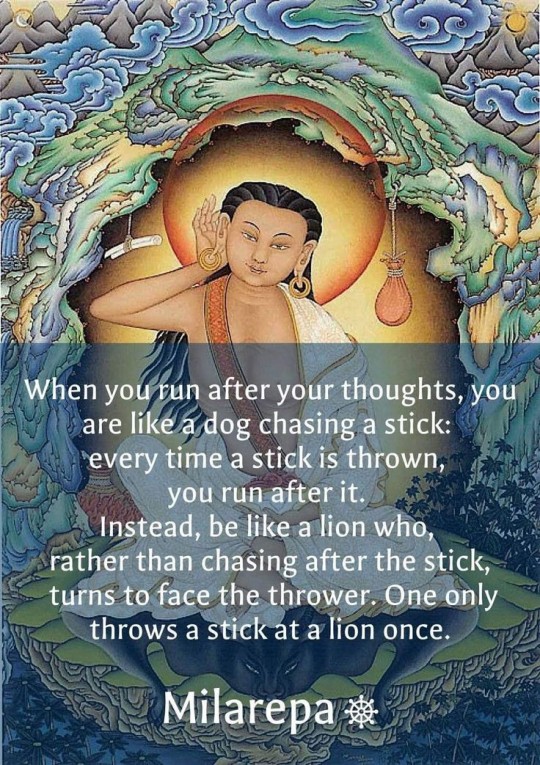

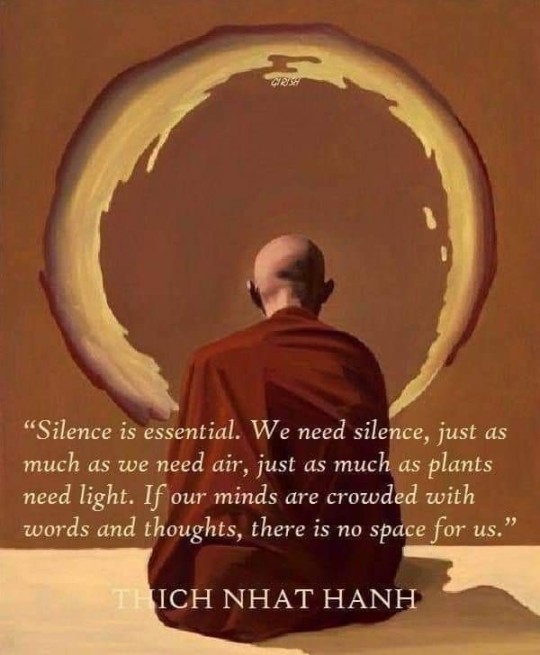
Credits: Pinterest. The voice of our consciousness/Inner voice and thoughts are not the same.
#buddha#buddhism#advaita#zen buddhist#buddhist#the buddha#meditation#buddhistmeditation#zen quotes#zen buddhism#zenmeditation#zenmasters#buddhist monk#buddhawisdom#siddhartha gautama
5 notes
·
View notes
Text

Heracles and the Buddha
This is based on the fascinating fusion of cultures after Alexander the Great invaded India, otherwise known as Indo-Greek or Greco-Buddhism.
In Gandharan sculpture, Heracles is depicted alongside the Buddha as Vajrapani, the Buddha's protector. The pairing of two figures so iconic in their mythologies seemed perfect material for art.
The Buddha would help Heracles with anger management, while Heracles would help with clobbering evildoers. Business as usual.
#heracles#hercules#herakles#buddha#buddhism#zen#dharma#ancient greece#ancient india#indo-greek#vajrapani#greek mythology#greek myth art#classical mythology#the buddha#tagamemnon#art#illustration#mythology#buddhist#alexander the great#ancient history
92 notes
·
View notes
Text

The sacred grounds of Eiheiji Temple (永平寺) in Eiheiji Town, Fukui Prefecture
Photo by 小野悦史 [Ono Etsushi] in 2021
221 notes
·
View notes
Video
Koi Fish at Kanyoji Temple, Yamaguchi Prefecture, Japan | Masami Shirai
#Japan#Kanyoji Temple#Koi Fish#Japanese Garden#Koi Pond#Yamaguchi Prefecture#Buddhist Temple#Shunan#Nippon#Carp#Koi#Fish#Autumn#Zen Garden#Animals#Video
457 notes
·
View notes
Text
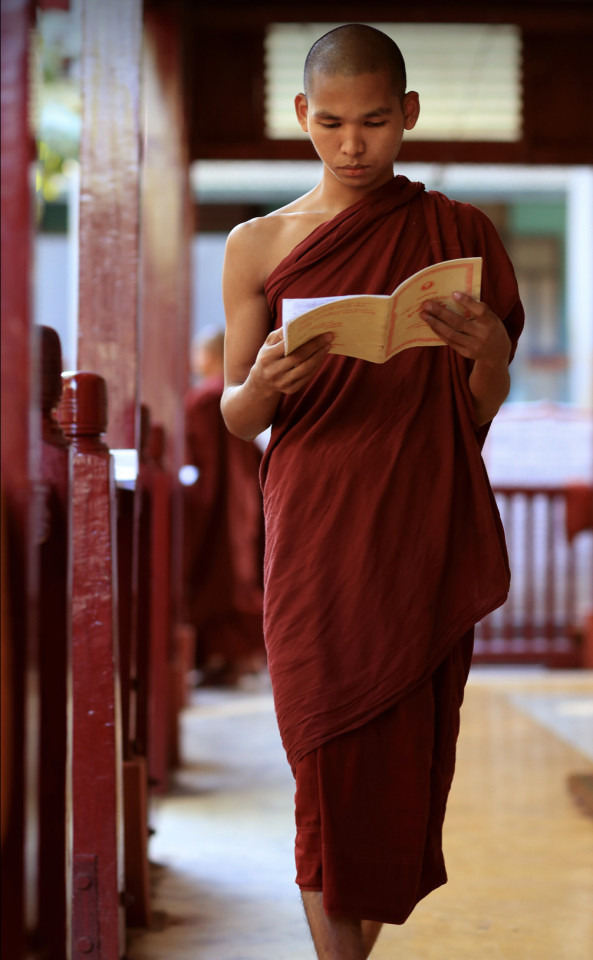
Upali (Ref) – Buddhsit practice in mountain forests
When Upali, one of Buddha's ten great disciples, asked Buddha's permission to enter the mountain forests to practise,
Buddha said, “Upali, there was an elephant bathing in a large pond. The elephant was washing his body, washing his back, washing his ears, and he was very happy. Seeing this, the rabbit also entered the pond, but his small body became afraid of the water and he jumped out. You are not fit for mountain forest training, O Upali. You should practise among the people." He advised him to do so. - (Samyutta Nikaya 99)
Upali was a barber of Buddha’s birthplace before he was ordained. Thus, he probably had a gregarious personality. It is an incredible pain for such a personality to live a solitary life deep in a mountain forest. Therefore, the Buddha advised Upali to be among the people and to practise.
The Buddha encourages those who are fit to practise in the mountain forests to do so. The Buddha gives guidance appropriate to each person according to his or her personality. That was the Buddha’s way.

ブッダから弟子たちへ、ミニシリーズ (9)
優波離(ウパーリ 参照) 〜 山林での修行
ブッダの十大弟子の一人、優波離が山林に入って修行したいとブッダに許可を求めたとき、
ブッダは「優波離よ、大きな池で象が水浴びをしていた。身体を洗い、背を洗い、耳を洗い、まことに楽しげであった。それを見て、兎もまた池に入ったが、小さな身体で水が怖くなり、飛び出してしまった。優波離よ、そなたには山林の修行は適していない。そなたは衆生の中で修行するがよい。」と、そのように助言された。― (相応部経典 99)
優波離は出家する以前、ブッダの生国の理髪師だった。したがって、彼はたぶん人懐い性格だったと思われる。そんな性格の人間が、山林で孤独な生活をするのはすごい苦痛だ。だから、ブッダは優波離には、人々のあいだにあって修行することを勧めた。
ブッダは、山林での修行がふさわしい人には、それを勧めている。ブッダは相手の性格に応じて、それぞれにふさわしい指導をされている。それがブッダのやり方だったのである。
#zen#mindfulness#buddhism#buddha#buddha's 10 great disciples#upali#wisdom#philosophy#nature#art#buddhist practice
127 notes
·
View notes
